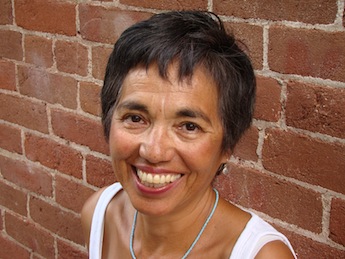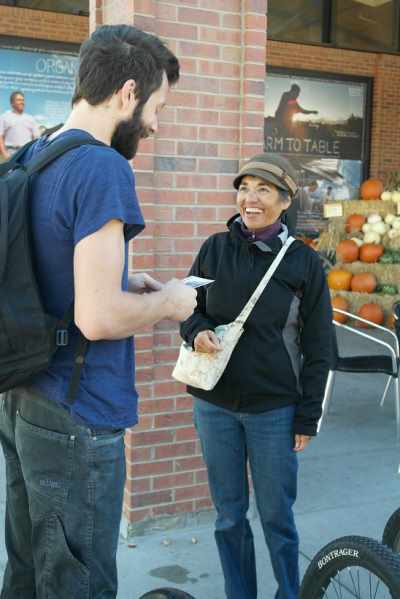This is the fifth in a series of candidate profiles written by journalism students at CU-Boulder. April Nowicki is a graduate student and local freelancer reporting on renewable energy, water conservation, smart electricity grids and other environmental issues as well as local people and events. Her work has been published by the Denver Business Journal, Daily Camera, Rocky Mountain Institute, GreentechMedia.com and The Boulder Stand.
In 1978, Mary Young was taking the bus up the Diagonal Highway to her job at the IBM office in north Boulder.
Today, she’s ridden every single bus route in Boulder, and said that one of her favorite experiences from the local public transit system was riding the 15L bus all the way down Colfax in Denver.
“You can see 130 different cultures and kinds of people on that bus,” she said. “It’s mind-blowing. The bus keeps you in touch with the real people you’re serving. That’s hard to do.”
Young’s campaign for Boulder City Council is driving a new idea for public access to the local city buses and light rail. That idea could be an essential element in creating a long-term sustainable community.
As of 2012, about 7,500 households in Boulder County had access to a neighborhood EcoPass. That’s less than 20 percent of the total households within the county limits. The current access to an EcoPass is limited by the implementation plan for each one, which tasks volunteers with fundraising up to $60k and handling private information about thousands of their neighbors. Young admits that her goal to give an EcoPass to everyone in Boulder will require policy and infrastructure changes that will take time and negotiations.
“People want things to happen now,” she said. “It’s not going to happen now. It’s going to take redevelopment. It happens as it happens. First you have to plan for your vision.”
Her vision is backed by an education in engineering and almost five years serving on the city Planning Board. The basis of a city-wide EcoPass for everyone is meant to give the city traction toward achieving other goals for sustainability in the local economy, education system, energy production and greenhouse gas emissions. Community member Tim Hillman agrees that all these things are connected.
“Mary and I have discussed extensively her stance,” Hillman said. “I think she recognizes that the greenest kilowatt is the one not used. Whether [you call it] conservation or efficiency, it will get us the greatest economic benefit and greenhouse gas emission reduction.”
Hillman has known Young as a neighbor, friend and colleague in the local community for almost ten years. He has owned several types of the EcoPasses over the years, including the CU Boulder student pass and a business sponsored pass sometimes offered as an employee benefit.
“Having that pass has basically guaranteed that that’s my transportation option,” he said. “It’s a bummer. As long as you’re in these communities, you have access to the amenities. Neighborhoods with a lower income might not be able to support those programs.”
Young said that she grew up of modest means, with a single mom and four siblings. She said that people on the lower socioeconomic scale are working jobs that need to be done, but sometimes aren’t recognized for being the gears that keep everything running.
“There’s this guy,” she said. “He’s the hardest working guy. In the summer and fall, he’s out there early in the morning, with his little scooper, scooping up the cigarette butts on the mall. I went by him on the way over here, he works downtown too. He’s just buzzing around. He works so hard to keep that mall looking good. He may singlehandedly be the guy who is keeping the mall clean.”
Finding the time to take care of basic issues, like making sure that that person and his family have the same access to public transit that 7,500 other households do, is as much at the forefront of Young’s campaign as municipalization, greenhouse gas emission reductions and accessible neighborhoods. She also says she won’t wait for citizens to take the initiative for change.
“God put the ‘out’ in outreach,” Young said. “We should be going out, not expecting people to come to us.”






